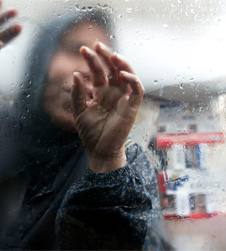
I left something back in Northern Syria but there isn't a name for it. I think it might be a sane, working knowledge of the balance between light and dark in the world. Crossing the border near Kilis to the Bab as-Salaam was like falling into one of those myths where the demons and angels are at war with each other in a cosmic boxing ring, each side fighting for control of the universe until one side subdues the other, but of course never completely, while the world is painted over in flashes of lightning, scoured by gargantuan floods, charred by fire, etc. All the innocent ones busy escaping at maximum speed, burrowing down into the cold ground, thinking this cave is going to have to be it for a while because there are worse fates than caves.
In Aleppo, a city that is at least five millennia old, everyone and anything was a target of the Assad regime. I saw rubble piles where a major hospital stood, the mourned victim of an air strike. Not in ten years in Iraq and Afghanistan have I seen such firepower directed at civilian populations, where killing the greatest number of people was the purpose of the attacks. I might have seen more combat in weeks in Syria than in years of covering Iraq.
"We know that our lives will be destroyed," a revolutionary named Aref Zidan told me way one night in February. "We accept that our lives will never be what they could have been. It is our duty. We are fighting for the next generation so they can have normal lives." All the other young men in the Aleppo Media Center agreed with Suhaib on the idea of sacrifice even if they didn't know what sort of government to support in the future. In the weeks I was there, I lost count of the air strikes directed at the neighborhood and quickly came to dread the shriek of fighter jets on their bombing runs. Everything is a target, we cried. Everything. First, find an interior and get away from the windows, then wait for the bomb. Imagine living through more than two years of this and still choosing to stay and try to survive it, to try and form the institutions of civil government and mechanisms of aid. The word bravery doesn't even cover it. I know all the arguments for objectivity but all that noise was gone for me in the first 24 hours in Syria. It just is not possible to say that both sides are morally equivalent when one side is willing to perpetrate any atrocity to secure a victory.
Bashar al Assad, playing the role of the demon king in the myth, possesses tanks, ballistic missiles, chemical weapons, fighter jets, and artillery in such fantastic abundance that he can lay waste to entire cities. On the nights of February 18th and February 24th, scud ballistic missiles fired from Damascus grazed the edge of space and fell into neighborhoods in eastern Aleppo faster than the speed of sound, turning entire city blocks into dust and killing hundreds. The attacks were timed so most people would be home preparing dinner when the missiles hit. For each of these events, it happened that I was less than half a mile from the impact sites. I saw the deep red light of the detonations and half a second later felt the shockwave that shattered the windows in the media center building where we were working, a building that also houses refugee families, because there are refugees absolutely everywhere.
Some of these photographs were taken minutes after the missiles landed, while volunteer rescuers were digging for survivors, while there was still hope of finding some. As the rescuers gathered to dig through the rubble on the 18th of February in Tariq al Bab, the regime forces launched mortar barrages at the crime scene to kill even more. Much of my response was a disbelief that the so-called civilized world would permit such a thing to occur and that anyone could be so brutal to do it in the first place.
On February 25th, at the site of the one of the missile attacks in Ard Al Hamra, which like the others, had no military significance at all, an armed man took my hand very tenderly and led me to a destroyed building. On the ground was something wrapped in red cloth. There was a great deal of shouting and I was concerned the furious crowd would turn on a foreign reporter. Instead, the man reached down and unwrapped the body of a very small child, turning his palms upward in a gesture of supplication. ![]()
 LEAD IMAGE: Alleppo, Syria, February 2013.
LEAD IMAGE: Alleppo, Syria, February 2013.Photo: Phillip Robertson
© Phillip Robertson, 2009-2020.
